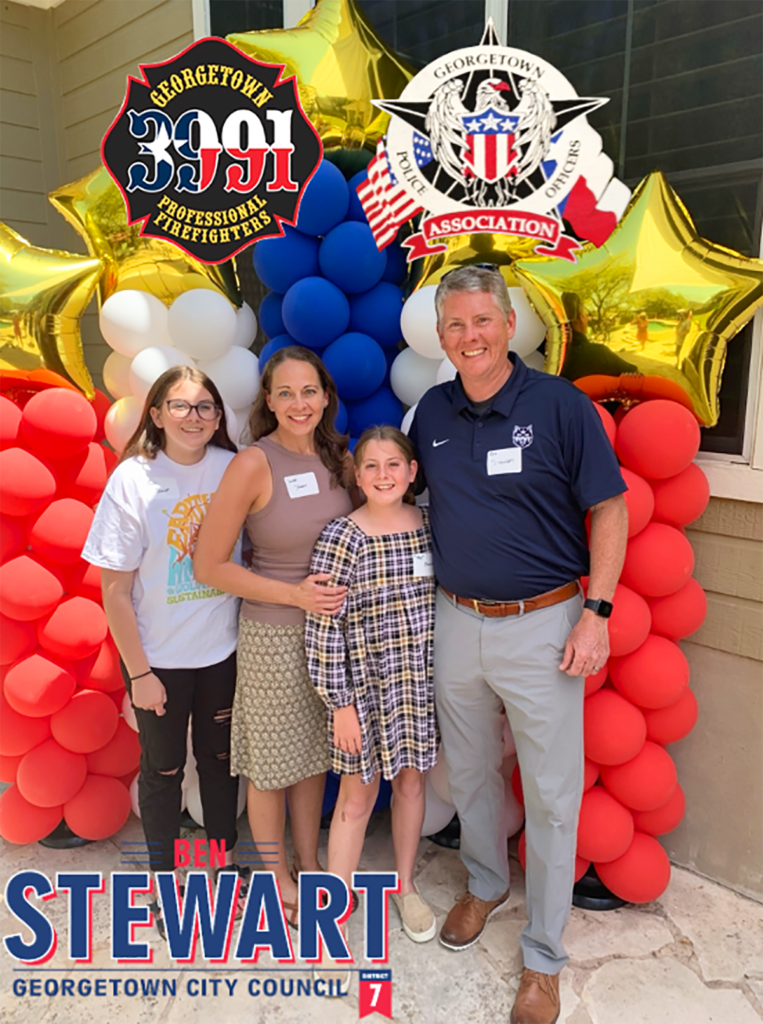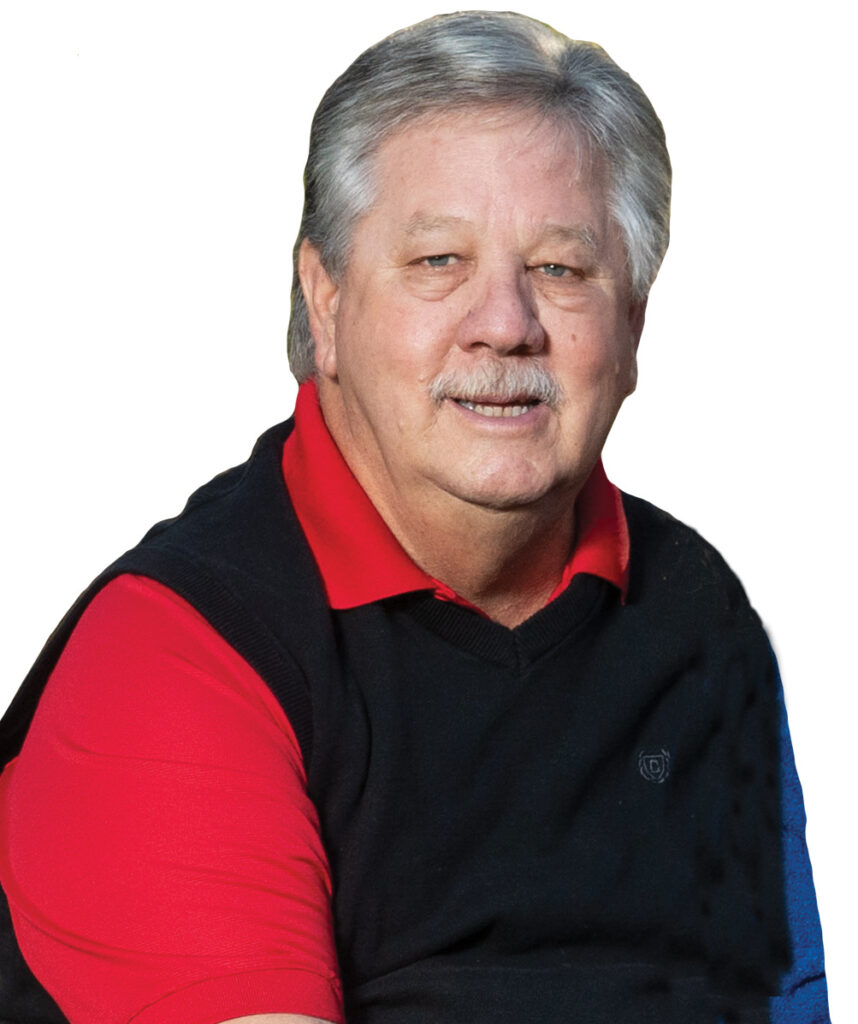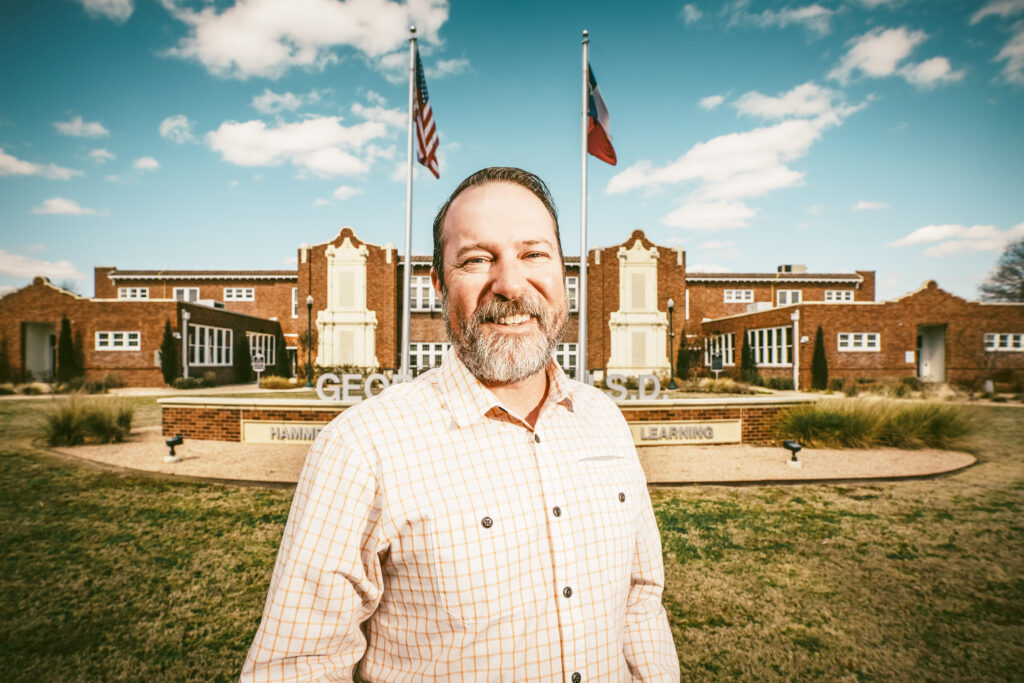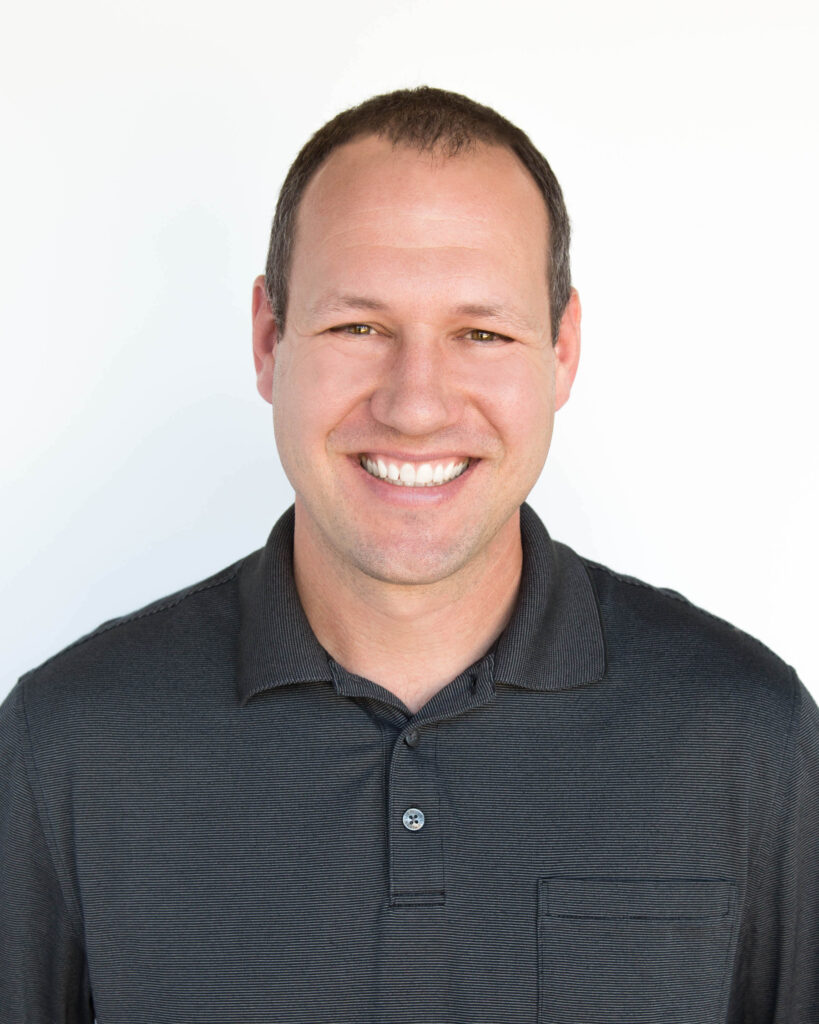COUNCILMAN BEN STEWART

Ben Stewart’s journey to the dais began with active involvement in his children’s education after his family moved to Georgetown 10 years ago. “I started as a concerned parent and became concerned for the entire community,” he says.
He wore multiple hats in the last decade—treasurer and president of the PTA then school board trustee; member of the Planning and Zoning Commission, City Charter Review Committee, Georgetown Transportation Enhancement Corporation, and Georgetown Government and Finance Advisory Board—all of which taught him the inner workings of the school and city government. When Ben, a technical consultant, learned District 7 Councilman Tommy Gonzalez wouldn’t be running again, he decided to step up and be a voice for his community once again. “I’m excited and terrified at the same time. You realize when you sit in that seat what a big responsibility it is, and I hope to serve the people well,” he says, adding he will always be a listening ear for constituents. “We may disagree, but I’m always willing to listen.”
Ben plans to focus proactively on traffic issues, public safety, and smart growth. “When we moved here ten years ago, District 7 was a lot more agricultural than it is now. Working with residents and developers to find common ground when transitioning agriculture zoning to developed properties will be a focus as District 7 continues to be a national focal point.”
COUNCILMAN RON GARLAND

Working for the Boy Scouts of America for almost 40 years and being a member of the Rotary taught Ron Garland the importance of active citizenship and service in one’s home, community, and nation. When he and his wife Barbara retired and moved to Sun City, the first question he asked was, “How can I serve this new city we live in?”
Initially unenthusiastic about becoming a politician, Ron’s mind was changed by a conversation with former City Councilman Steve Fought about the role council members play in shaping the community. Serving on the council dais since May, Ron applies the Four-Way Test passed down by his Rotarian grandfather—Is it the truth? Is it fair to all people? Will it build goodwill and better friendships? Will it be beneficial to all concerned?
Ron plans to work to benefit the community by focusing on growth management, long-term water planning, and mobility bond projects like the extension of DB Wood Road, the widening of Shell Road, and the new I-35/Williams Drive intersection. “We’ve just been named the fastest growing city in the country—it’s exciting on the one hand and challenging on the other. We have to sustain the feel of Georgetown, and we can maintain that feel through good strategic planning and managing growth,” he says.
GISD TRUSTEE JAMES SCHERER

The most important lesson James Scherer learned in high school is that education is about more than just test scores and ratings. “It becomes, how do you push that excellence without losing kids in the process like me?”
As a homeless teenager, James never thought the coaches, teachers, administrators, and counselors who pushed him to succeed would one day inspire him to become a voice for other at-risk kids and advocate for holistic education. “I was 17 and angry. It meant nothing to me. But looking back, it was very powerful what they did for me,” he says.
Determined to find an equally caring education for his kids, James was drawn to Georgetown’s community-oriented schools. When he wasn’t focusing on his “serial entrepreneurship” buying and fixing companies, he served as PTA president and coach doing “anything and everything anyone asked. I always enjoyed being involved with the kids, working with and mentoring them.”
It wasn’t until he ran for school board that he discovered two opposing education views in the community—one advocating for improving STAAR test scores, and another not wanting to become a teach-to-the-test district. “Should we switch our focus to STAAR test-based goals, or stay focused on social, emotional learning? In reality, it’s the same thing,” James says. “If we’re doing everything foundationally well, we’ll be able to succeed at all those other things.”
Repairing that foundation starts with fixing low attendance, he says. “Our attendance data are terrible because of COVID, but we can only blame COVID for so long. We acknowledge that COVID happened, but at some point we must normalize. If kids are not in school and are three, four, seven days behind, those poor teachers have no chance to succeed.
“We need to evaluate and getting kids back in the classroom on a regular basis. At that point the concern becomes behavior and discipline—big foundational pieces. If the district is healthy there, we can begin looking at bigger-picture items.”
GISD TRUSTEE CODY HIRT

You may have seen Cody Hirt around town running one of his businesses—Mesquite Creek Outfitters or The Golden Rule—helping veterans through his nonprofit, Veteran Outdoors, or most recently, helping shape the future of education in Georgetown as a school board trustee.
A zeal for giving back and concern for how important early literacy is right now inspired Cody to run for school board. Students around the country are showing learning loss during the pandemic, but even before that, the district needed to strengthen early literacy programs, he says. “With new guidelines from the state in place, it was time for us to put maximum effort into ensuring our younger students are proficient in reading and writing,” says Cody, who made his home in Georgetown in 2008 with his wife Jordana and two kids, 12-year-old Hannah and 9-year-old Reid. “As the time went by and I got further and further into the campaign and spoke with students, teachers, parents and administrators, the list of reasons to run grew and grew. As a parent and deeply engaged community partner, I see firsthand how hard our teachers and staff work for and protect our kids, and it’s my mission to support our district to ensure positive outcomes for all.”
He plans to accomplish that goal through “sound fiscal policies, strong foundational academics, communication, and a solid relationship with our community to provide wrap-around support for students, teachers, and families. We also need to work collaboratively as trustees with the superintendent to improve TEA ratings, increase teacher pay and retention, and help our district reach and exceed our goals for the future.”
